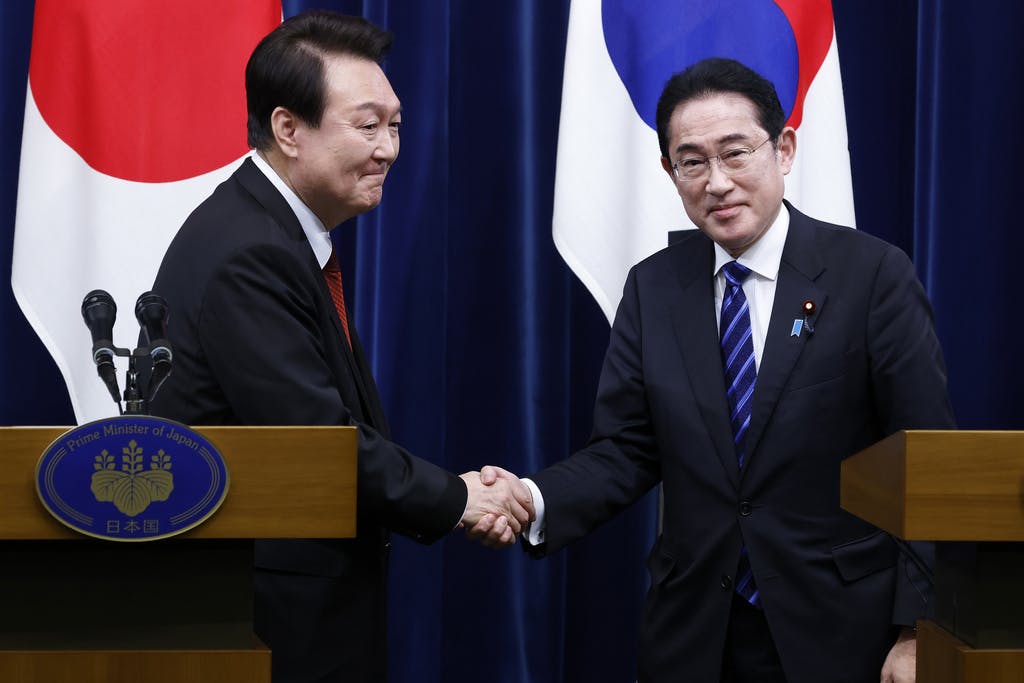The Hypersensitive Topic That Leaders of China, Japan, and Korea Will Avoid at Parley Next Week
The independent island democracy of Taiwan is nowhere to be found on the agenda of meetings Sunday and Monday as Seoul hosts leaders from Tokyo and Beijing for the first time since the Covid pandemic.

President Yoon of South Korea knows that one hypersensitive topic will be almost taboo when he hosts leaders of Japan and Communist China at Seoul for their first trilateral summit since the outbreak of Covid in China in December 2019.
The independent island democracy of Taiwan is nowhere to be found on the agenda of meetings Sunday and Monday when Mr. Yoon greets China’s Premier Li Qiang, a stand-in for President Xi, and Japan’s Prime Minister Yoshida.
As beefed-up mainland Chinese forces scoured the skies and seas around the Republic of China on Taiwan for the second day, Korean and Japanese leaders chose to ignore Beijing’s aggression in the region, at least for the duration of the summit.
South Korea’s deputy national security adviser, Kim Tae-hyo, told Korean reporters the summit would “serve as a turning point for fully restoring and normalizing the trilateral cooperation system.”
Avoiding Taiwan, however, he said the the threesome would stick to such “areas of cooperation” as the economy, trade, medicine, science, and “people-to-people exchanges.”
Unless the summit winds up in total disarray, it will conclude Monday with a “joint statement” that skips regional tensions stoked by Chinese bullying in the wake of the inauguration Monday of a tough-minded new Taiwanese president, William Lai, who said before his campaign for president that Taiwan is a de facto nation free of the grip of Beijing.
The trilateral summit, however, may touch briefly on North Korea, which China keeps on life support with oil, food and other critical items.
South Korean officials, anxious to brush aside complications and recriminations over Taiwan, pledged Seoul would go on “respecting the One-China policy.” Seoul formally views Beijing as the capital of all China while maintaining an office at Taipei, Taiwan’s capital city.
Just as Washington changed its embassy to an institute after President Carter recognized Beijing as the Chinese capital in 1978, South Korea followed suit in 1992.
While Mr. Yoon was preparing for separate critical meetings with Messrs. Li and Yoshida on Sunday and then with all three together on Monday, the South’s Yonhap News reported that the foreign ministry was “communicating with China on the Taiwan issue.” The Chinese, said the ministry, were “well aware of our government’s position.”
Why the need for last-minute communications with Beijing about Taiwan? The answer appeared to be to smooth over Chinese complaints about a member of South Korea’s National Assembly and the head of the South’s Taiwan office attending Mr. Lai’s inauguration .
China was still more aggrieved by a congratulatory message sent by Japan’s chief cabinet secretary, Yoshimasu Hayashi, plus the presence at the inauguration of a huge delegation of 31 Japanese legislators — signs of Japan’s close relations to Taiwan and concerns about Chinese threats.
“If Japan ties itself onto the chariot of splitting China,” warned the Chinese ambassador to Japan, Wu Jianghao, “the Japanese people will be led into a pit of fire.”
Messrs. Yoon, Kishida, and Li will no doubt overlook such unpleasant words as they get down to agenda topics. They were expected to stick to bland comments about the need to resolve tensions and get along.
Mr. Kishida signaled this approach, saying the three would “keep engaging in practical cooperation” while sharing “a great responsibility for peace and prosperity.”
In that spirit, the Japanese news agency, Kyodo, was “uncertain” whether the three would “raise issues surrounding Taiwan.” However, it said, Yoshida and Yoon, talking one-on-one, were “certain to affirm the necessity of bolstering security ties with the United States,” which has often expressed its “commitment” to Taiwan’s defense.
In careful verbal gymnastics, all three leaders may also share their common concerns over North Korea.
Yonhap reported a government source saying there’s “a high possibility” of the final joint statement “including the issue of Japanese abductees as well as South Korean nationals” held in North Korea.
Japan has named 17 citizens whom it claims were abducted to North Korea more than 40 years ago, but many more Japanese are believed held there. South Korea says the North is holding six citizens, including three missionaries, as well as more than 500 kidnapped in the years after the Korean War and 60,000 prisoners of war who were never returned.
Lke Taiwan, North Korea is not on the advance agenda, but Mr. Yoon may also want to raise the topic of the North’s nuclear program. It’s widely assumed that China has advised the North against testing another nuke since its sixth test in 2017.
North Korea’s tyrant, Kim Jong-un, while shipping artillery shells and other munitions to Russia for the war in Ukraine, is believed to be upsetting Mr. Xi by toadying to President Putin ever since they met last September at the Cosmodrome near the Amur River in Siberia.
Mr. Kim in turn is presumably not happy about Premier Li seeing the leaders of South Korea and Japan, both of which Mr. Kim views as prime enemies along with America.

